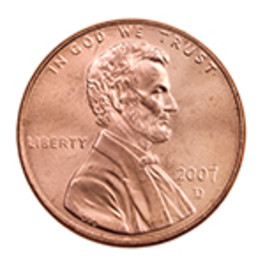Changing Change

Have you been following the debate about change—the change in your pocket, that is? In order to save money President Obama is recommending that the composition of the U.S. penny be reconsidered. All because of a long word nobody can spell, let alone pronounce: “seigniorage” (and that’s not Spanish for “Mr. Age”). Seignorage is the technical term that describes the difference between the value of a currency and its production cost. And right now our copper one cent piece (which is no longer copper, but zinc) costs 2 cents to produce. That’s why our neighbor to the north has decided to withdraw the Canadian penny from circulation, beginning February 4. Should the U.S. follow suit? Two thirds of Americans polled say No. Why such loyalty to an overpriced piece of zinc? Beyond the “what would we give to the Salvation Army?” quip, there is the fear that since many prices end in a 9, removal of the penny would be the equivalent of a “rounding tax” on consumers that one study suggests could be as high as $1.5 billion over a five-year period. And besides, if we got rid of the penny, we would have to mint more nickels, and a U.S. nickel now costs 10 cents to produce. But then there’s another study that concludes “getting rid of the penny could save $730 million per year by eliminating the time customers and cashiers deal with the coin in cash transactions” (TIME, February 4, 2013). So what’s a nation to do? What’s a God to do? Surely some have suggested to Him that the seven-billion-plus humans on this planet are hardly worth their original purchase price. Like the penny that in 1913 had “almost 25 times the purchasing power it does today,” even so the value of a single human being has surely plummeted beyond a reasoned defense for its salvation. But we humans are hardly pennies in the Treasury of Heaven, are we? Not if the worth of a single human soul is measured by the crimson price paid out on the auction block of Calvary. If the Good Shepherd was willing to lay down His life for just one hopelessly, miserably lost sheep, then the commensurate value of that one lamb is catapulted beyond calculation, is it not? “. . . He made a gift of such magnitude that it can never be said that God could have made His gift, His donation to the human family, greater. His gift defies computation” (Our High Calling 28). So if God so values the world—one lost human at a time—that He gave His Only Son, then should we not so value even just one lost soul—be it roommate, neighbor, classmate, peer or complete stranger? In seven days “iPerceive: A Future You Can Count On” begins (see www.iperceive.org for details). And if you can’t think of one lost friend or stranger to bring, would you please pray that Heaven will turn this short series into a salvation event for every lost soul who comes? Forget saving pennies—it’s people that are priceless.